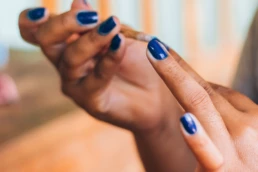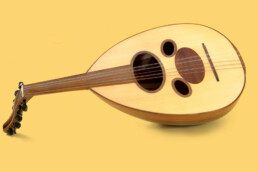I have been repeatedly asked by numbers of believing women as to the laws of bathing (ghusl) to remove sexual impurity (janabah), with the concerns around frequent ghusl and the impact it can have on hair health. Problems are exacerbated in hard water areas, not only to hair but to skin, and often skin is irritated either to frequent exposure, or the elongated periods spent in the shower detangling hair under running water. For some hair types (such as particularly curly hair) repeated showers can be quite costly having to saturate hair with conditioning products to provide enough slip to reduce hair breakage.
Even after having a bath, there are persistent issues. Certain hair types can take a significant period of time to dry, and if there is a frequent need to bath due to an active sex-life or recurrent nocturnal emission, persistent wet hair can lead to illness.
These concerns are in no way modern, approximately 1400 years ago it reached A’ishah that Abdullah b. Umar advised women to untie their hair if they bathed. Her response was the same as we might hear today: “How surprising of Ibn Umar! He directs women to untie their hair if they bath, he might as well direct them to shave their heads!” (Muslim)
To be sure, God has said concerning standing for salah, “And if you are junub (sexually impure), then cleanse yourselves.” (Quran 5:6), and to not come near salah “if you are junub (sexually impure) – though you may pass through the mosque – not until you have bathed.” (Quran 4:43)
However, what does bathe constitute in regards to washing the hair in this context, that is, the bathing of sexual impurity (ghusl al-janabah)? The Prophet’s wife Umm Salamah, asked: “Messenger of God, I am a woman who plaits my hair, must I untie it to bathe from sexual impurity?” He said: “No, it merely suffices you that you apply three handfuls on your head then pour water over you (i.e the rest of your body) to purify.” (Muslims and Ahmad)
According to the hadith, the following suffices for purification from janabah:
- Three handfuls of water poured over the head, and then the rest of the body saturated with water;
- Plaited hair may remain plaited; hair does not need to be untied;
- There is neither a requirement to rub water into the hair (or its roots) nor saturate the length of the hair.
[Explanation]
Now before explaining the bulleted points above, a preliminary point must be made especially for those who might have multiple baths within a very short space of time. Ghusl is not obligatory immediately after intercourse; it is a condition for those who wish to engage in certain actions such as salah, tawaf and dealing with the Quran. It is not necessitated merely to talk to another person or to sleep, nor is ritual impurity transferred from one human to another by touch; the Prophet said: “the believer does not pollute (others).” (Al-Bukhari and Muslim; narrated by Abu Hurairah)
Many of the aforementioned issues typically occur due to idea that the entire head must be saturated with water and rubbed, or that the length of the hair (to the tips) must be washed. To note, some of the assumptions are understandable given the hadith of Ali b. Abi Talib: “I heard the Messenger of God say: whoever leaves a spot of hair from sexual impurity which water does not reach, then God shall do such and such with him from the fire.” (Ahmad, Abu Dawud, al-Tayalisi, and al-Bazzar.) Furthermore, the hadith of A’ishah offers us a general description: “If the Prophet bathed due to ritual impurity he would begin by washing his hands, then he would pour with his right hand over his left and wash his private parts. Then he would perform ablution for prayer. Then he would take water and enter his fingers into the roots of his hair, until he believed he had poured over his head with three handfuls. Then he poured water over his entire body, and then washed both feet.” (Al-Bukhari and Muslim)
However, the hadith of Jubair b. Mut’im offers another perspective: “We were discussing the bath of janabah with the Messenger of God and he said: As for me, I take two handfuls of water and pour it over my head, thereafter I pour (water) over my entire body.” (Al-Bukhari and Muslim) The chief Hanbali jurist Majd al-Din b. Taymiyyah wrote in al-Muntaqa, ‘It is evidence for those (jurists) who neither necessitate massaging, nor gargling, nor sniffing.’
But must the general hadiths of Ali and A’ishah apply? A key hadith used by jurists to argue that they do not is the narration of Umm Salamah, the wife of the Prophet, who said, “I said: Messenger of God, I am a woman who plaits my hair, must I untie it to bathe from sexual impurity? He said: No, it merely suffices you that you apply three handfuls on your head then pour water over you (i.e the rest of your body) to purify.” (Muslim and Ahmad)
Based on this hadith, Ahmad b. Hanbal conclusively opined, as narrated by way of Muhanna, that a woman need not untie her hair if bathing from sexual impurity (but should do so for her menses). The hadith of Umm Salamah relates to janabah whilst the Prophet said to Lady A’ishah who was menstruating: “untie your hair and comb it (through).” (Al-Bukhari)
Generally, it is the asl (default position) to untie the hair so as to ascertain water reaching that which is obligatory to wash but there are clearly allowances made for bathing from sexual impurity since it occurs often and causes both difficulty and harm. (See Ibn Abi Umar’s al-Sharh al-Kabir) To reflect this, we find that ‘it reached A’ishah that Abdullah b. Umar was directing women to untie their hair if they bathed. She said: “How surprising of Ibn Umar! He directs women to untie their hair if they bath, he might as well direct them to shave their heads! The Messenger of God and I would bath together and I would not pour over my head more than three handfuls.’ (Muslim) The notion of ‘shaving their heads’ is predicated on the fact that frequent washing can lead to hair loss from breakage and tangling.
A similar point of view was also considered for washing the length of the hair to the roots. Whilst some Hanbalis (and the school of al-Shafi’i) viewed it as obligatory relying on the hadith “beneath every hair is janabah, so wet the hair and cleanse the skin” (Abu Dawud and al-Tirmidhi), it was the opinion of leading Hanbali jurists such as Ibn Qudamah, and before him intimated by al-Khiraqi, that it is not obligatory to wash all of the hair given the response of the Prophet to the concern of having hair in plaits, “It suffices you that you apply three handfuls on your head”. As Ibn Qudamah pointed out, ‘This does not usually soak plaited hair, for if saturation were obligatory, it would then (also) be obligatory to untie the hair so as to know that saturation had been achieved.’ (Ibn Qudamah, al-Mughni)
An interesting point of consideration specific to janabah is whether there is a requirement to wash the hair at all. Ibn Qudamah emphatically questioned the assumption arguing the analogy that in the shari’ah, the hair is not considered a part of the animal (with humans considered articulate animals – hayawan natiq) given that hair does not become impure by death, nor is there life in it, nor is ablution negated by a man touching a (non-mahram) woman’s hair, nor is a woman divorced by her hair (i.e. “I divorce your hair!”). Given the shar’i division between the two, it is not obligatory to wash it just as it wouldn’t be obligatory to wash her clothes merely for having worn them during sex. (See: al-Mughni) Ibn Qudamah’s response to the hadith used by interlocutors “drench the hair” is persuasive: al-Harith b. Wajih alone narrates the hadith, and his narrations are weak when narrating from Malik b. Dinar.
Alternatively, it may be argued that the eyebrows and eyelashes must be washed so why not the hair on the head? I assert that eyebrows and eyelashes are washed by necessity in order to reach the skin underneath which constitutes the face for which there is no concession for partial saturation; those parts of the face is only reached by washing the hair that sits on top. It essentially goes back to the legal maxim: that which is necessarily required to fulfill an obligation also becomes obligatory.
To be clear, the hadith of Umm Salamah is pivotal for an overview for it proposes the following:
- the prophet took into consideration the circumstances of women on this matter;
- that three handfuls of water over plaited hair suffices although it neither saturates the entire head nor the length of the hair.
As indicated from the prophetic directives, God desires that believing women purify themselves but without harm or injury to person nor obstructing the needs of intimacy. A divine wisdom that becomes clear is that the purpose for frequent baths (i.e. intercourse) should not become the cause of subsequent troubles: the loss of desire in the husband due to the hair loss of his wife. Additionally, God has limited the possibility of deen being used as the excuse to impede the rights of spouses. In order to maintain sexual attraction but also ensure purity, God lightened the burden on a woman and offered her a normative approach that beautifully balances the maslahah (benefit) of intimacy with corporeal purification to devotionally worship the Most High.
All praise is for the Most Wise, and we defer full knowledge to Him alone.
Related Posts
15 Comments
Add comment Cancel reply
This site uses Akismet to reduce spam. Learn how your comment data is processed.





JazakAllah khair for writing on this. Just to clarify in case I have misunderstood, would it be permissible to not wash the hair at all, given that doing so regularly causes damage to the hair and puts women off having sex regularly?
When it comes to sexual impurity (janabah), the purpose is to wet the scalp – not wash the hair, which is why the three handfuls exists.
Jazakallahu khair. May Allah increase you in knowledge
Is it a condition for the hair to be plaited (rather than tied in a ponytail for example) for the three handfuls of water to be sufficient?
No. Ponytail is fine.
Asalamualikum,
Jazakallahukhairan for the thoughtful article.
About the three handfuls- is a handful the left and the right hand together, or just one hand (the right hand?
One hand.
Wetting hair causes a burden on many women who usually only wet their hair once a week. Is there any room to NOT wet the hair at all asides from normal wudu? And still pray ?
There isn’t a concession if they do not suffer from a condition
Please clarify.. So long as your hair is tied up I.E ponytail, high bun or plaited. You don’t need to have a full ghusl. Just the three handfuls of water will suffice? And if your hair is open and out then a full ghusl should be done asap.
If you mean by full ghusl washing all hair, then that is not a necessity when bathing due to sexual impurity.
Jzk! I have heard or read from various sources that after every sexual activity/encounter, one should do bath/ghusl ASAP.
Jazakallah Khair. This detailed exploration of bathing laws in the context of sexual impurity showcases a compassionate understanding of women’s concerns, balancing religious obligations with practical challenges. It reflects a nuanced approach that respects individual circumstances, demonstrating a wisdom that seeks to uphold purity without causing undue harm or impediments in intimate relationships.
This article gives me hope! Will share it with the Mrs and see what she says, because for far too long, I have had to patiently wait until she is ready to wash her hair during a full ghusl. As any man can imagine, it is frustrating. Wonder what the Hanafi rulings are…
Is it permissible to wipe the hair three times due to extreme hard waters and drying of the scalp? Hair health is deteriorating due to the hard water and with wetting the hair and scalp everytime after sexual intimacy it causes great difficulty